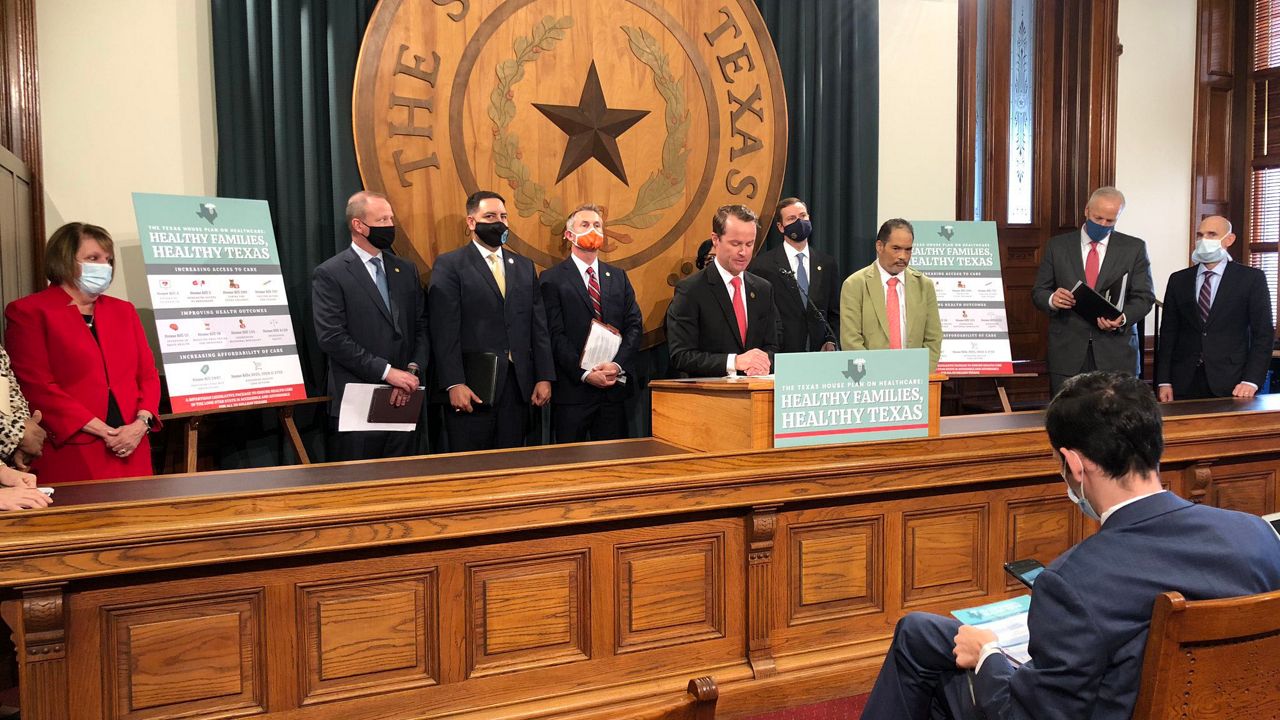AUSTIN, Texas — On April 7, House Speaker Dade Phelan and a bipartisan group of legislators held a news conference to highlight Texas health care priorities.
The Beaumont Republican threw his weight behind a bill that would extend Medicaid coverage to mothers for a year postpartum as part of a broad package of proposals meant to increase access to affordable health care in Texas. As it stands, moms are kicked off after two months in Texas — though about a third of deaths happen 43 days or more postpartum.
The House package drew both applause and criticism from some advocates, who said it ignored one policy change that would cover the greatest number of uninsured Texans — expanding Medicaid to cover more low-income adults.
The number of reported maternal deaths has increased nationwide in recent decades, and Texas data shows Black women in the state die disproportionately while pregnant or after delivery from causes like infections, heart problems and mental disorders.
Following the news conference, Laura Guerra-Cardus, Deputy Director of the Children’s Defense Fund and a leader of the SickofitTX Campaign, said that while she was excited to see the legislature expanding health coverage for women and children, she and others believe that low-income workers are still vulnerable.
“Texas has both the highest rate and number of uninsured people in the nation,” she said in a statement to Spectrum News 1. “If Texas fails to expand coverage this session, over 1.4 million Texans — including essential workers in child care, home health, the service industry, and many other essential jobs — will remain unable to access health care or to financially protect themselves and their families. Texas cannot recover while Texans are not covered.”
Texas leaders, she and others believe, should pass the Live Well Texas bills HB 3871 and SB 117. The legislation would draw down billions in federal funding to provide low-income Texans with access to affordable coverage.
Voters in Oklahoma and Missouri have accepted federal Medicaid expansion funding to cover grocery store workers and other low-wage uninsured adults. Texas is one of only 12 states that hasn’t implemented Medicaid expansion yet.
Under Medicaid expansion — a widely used state policy option for significantly reducing uninsured rates around the country — an estimated 1.4 million uninsured low-wage Texans would become eligible for Medicaid health insurance. That estimate, released by Kaiser Family Foundation in early 2021, is based on data from 2019 and is expected to rise as more data becomes available regarding the loss of work-based health insurance during the COVID-19 pandemic.
The KFF estimate also shows that nearly 800,000 Texans were in the “coverage gap,” meaning their income was below the poverty level and, under current state law, they likely had no affordable insurance option. The rest of the 1.4 million Texans have incomes between the poverty level and 138% of the poverty line. In addition to covering adults, Medicaid expansion has been shown to indirectly decrease the children’s uninsured rate by connecting more families with health coverage.
Dallas Democrat Toni Rose proposed the bill that would extend Medicaid to a year postpartum. The legislature failed to pass a similar measure in 2019, when the cost of extending coverage was estimated to cost more than $70 million a year.
Just before Texas announced its suite of health care bills, Congress passed a pandemic relief bill that incentivizes states to extend it by waiving a lengthy and cumbersome process they would normally have to go through.
The federal government has also sweetened the pot for the dozen states, including Texas, that have not more broadly expanded Medicaid to adults who can’t afford insurance but don’t currently qualify for the public program.
Legislation to do that is pending in both chambers, though it was left out of the House’s plan.
While women can qualify for Medicaid if they are pregnant, a mother with one child would have to make less than $196 a month to be eligible as a parent in Texas, which has the strictest income limits of any state, according to the KFF. Medicaid pays for about half of births in Texas.
Texas’ maternal mortality rate is slightly higher than the national average, though that’s based on deaths that happen during pregnancy or within 42 days of delivery. More than 600 women died nationwide in that time frame in 2018, and 277 died 43 days to a year after the end of their pregnancy, according to federal statistics. More than 90 women died in Texas that year — 22 after the 42 day marker used by the government.
There is a Texas program that gives mothers one year of coverage for mood or substance use disorders, diabetes, asthma and cardiovascular disease. The program only covers outpatient services that are limited in scope. Medicaid provides the same services and additional medications, testing and hospitalizations not covered by the state program.
Advocates have said the state program has almost no network of specialty or mental health providers to deliver those services right now.
The rate of maternal deaths has gained attention nationwide. Experts and studies have found many of the deaths are preventable and that the maternal mortality rate is higher in the U.S. than other high-income countries. The risk is particularly acute for Black and indigenous women, who are two to three times as likely to die than white women.
The past year has been something of an experiment in extending Medicaid coverage for new moms. Because of the pandemic, the federal government temporarily stopped states from kicking new moms off Medicaid.
Doctors and advocates told lawmakers at a March hearing that losing insurance two months after delivery can affect new moms, especially those with limited means. Uninsured women who forgo health care because of the high costs might find out they have underlying health problems at their prenatal appointments but can’t address them before their insurance coverage ends, doctors said.
